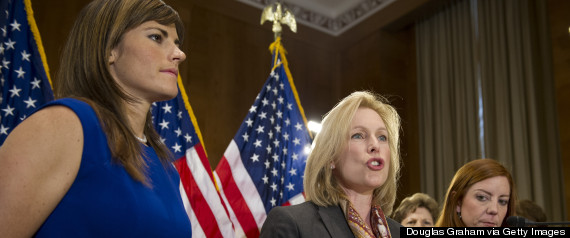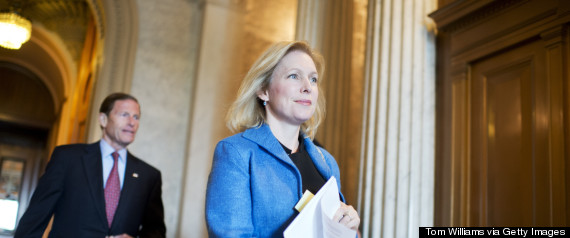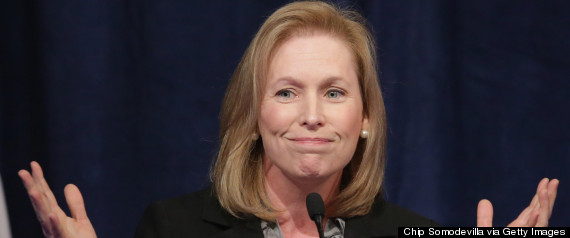
Kirsten Gillibrand is a cool chick.
As a 28-year-old Manhattan lawyer watching Hillary Clinton declare "women's rights are human rights" on the world stage, Gillibrand was moved to shift her course towards public service. She entered the House of Representatives after winning a hard-fought race against a four-term Republican incumbent in 2006. Just two years later, she received a surprise promotion when she was appointed to fill Hillary Clinton's Senate seat as her idol-turned-mentor became the secretary of state. At 42, Kirsten Gillibrand was youngest senator in Congress.
In the Senate, Gillibrand ensured health care for 9/11 first responders and stood on the front lines of the fight to repeal "Don't Ask, Don't Tell." She held the first Senate hearing on sexual assault in the military in nearly a decade, challenging the military's ability to prosecute crimes against women committed by those in their own ranks. This summer, she introduced a bipartisan bill to more effectively prosecute sexual assault on college campuses and penalize those that fail to do so.
Senator Gillibrand addresses all this and more in her new memoir Off The Sidelines: Raise Your Voice, Change the World. Her impressive record on women's issues goes deeper (OK, a bit shallower) than politics: She lists "girl crush" Tina Fey next to the president as someone she's nervous to talk to, speaks candidly about her "fat jeans," knows the utility of a well-timed F-bomb and is pretty tired of dudes talking about what she looks like.
Frank in matters of female friendship and family leave alike, Gillibrand offers some blunt prescriptions for a women's movement she worries is "on life support." From combatting a general lack of sympathy for sore breasts to institutionalized apathy towards victims of sexual assault, Gillibrand shows just how critical it is for women to occupy decision-making roles, and offers a few guidelines for getting there:
1. Always stand up for yourself. And your boobs.
Gillibrand shares an anecdote that perfectly illustrates how the day-to-day realities of women's lives can fall on deaf ears among a male-dominated congressional staff. When assigned a shift to preside over the often-empty Senate chamber:
The time slot I was given could not have been worse: 5:00 p.m. to 7:00 p.m. I tried to explain to the young male Senate staffer who issued my orders that these hours were impossible: I had an infant whom I need to nurse during that time, and if I didn't feed him, I'd be extremely uncomfortable. (Any more detail than that would have fallen into the category of too much information.) The staffer didn't care.
When a woman who is nursing misses a feeding, her breasts get sore. Believe it or not, this doesn't factor in to the administrative planning of an institution that has never been less than 80 percent male. But sore boobs just will not do. So Gillibrand called upon a few fellow senators to switch slots until she found a sympathetic ear in Senator Mark Udall.

What "boy's club?"
2. There is power in showing emotion.
When Gillibrand was appointed to Hillary Clinton's Senate seat in 2008, she inherited Clinton's health care bill for 9/11 first responders. Understandably, speaking about the men and women who ran into the towers on that day, and the illnesses they suffer today as a result, didn't make for stoic debate.
"I really didn't want to cry on the Senate floor; that seemed like a total breach in decorum. I contained it, sort of, and continued reading... I left the podium feeling pretty insecure," Gillibrand writes. It turned out, showing emotion doesn't signal defeat, but makes a persuasive case for victory:
Then a Senate page ... approached me and said 'Thank you so much, that was such a powerful speech.' No one had done this to me before, nor has anyone since... To be clear: I did nothing brilliant. I didn't deliver my address with great oratorical style. I didn't even speak in my own words. I just read a letter and allowed myself to feel the pain contained in it and show that pain to the world. In my mind, that will always be the moment I learned my most powerful moment about advocacy.
The bill passed unanimously.
3. Get angry.

In her fight against the Department of Defense on how the military handles sexual assault, Gillibrand confronted some truly enraging defenses of the status quo:
... When generals sat before me in a row and started saying that same ridiculous line, that we needed to keep decision-making about whether to prosecute sexual assault in the chain of command for the sake of "good order and discipline," I lost it, for real... I'd had it with their bullshit and condescension... People often remark that it's hard for women to get angry and public and still be taken seriously. On that day, and on many days after it, I didn't care.
Fighting with men, about an issue that largely perpetrated by men, which "would have been a no-brainer" if more women served in Congress, is definitely worth getting angry about.
4. Ambition does not come at the expense of femininity.

As a newly-appointed member of the Senate Gillibrand was "nicknamed Tracy Flick, the aggressive, comical, and somewhat unhinged blonde high school student in the movie 'Election,'" she writes. "I liked the film well enough, but this was not a compliment. It was a put-down to me and other ambitious women, meant to keep us in our place. Yes, I'm competitive. I fight for what I believe in, and I drive hard toward my goals. Does that make me ruthless or crazed? No."
Her advice? Carry on, proving your ambition is not in spite of your womanhood, but because of it:
Do not fall for the lie that ambition is counter to femininity. What creature is stronger and more motivated than a mother protecting her children? Use that feminine strength. It's a huge asset ... Trust yourself... Confidence is infectious and builds momentum. Share your faith in yourself. You'll be surprised how quickly others will come to have faith in it.
5. We need to rethink the idea of "Having It All."

A woman after our own heart, Gillibrand calls the discussion about whether women can "have it all" an "absurd frame." "For almost all mothers, earning money is a necessity, not a choice. We need to stop pretending that work is optional for all but the most financially secure American women," she writes. "That we have come to a place where women seeking work and family can be seen as overreaching, even selfish, is inane."
6. We should shift our thinking to "doing" it all.
"Having it all" not only "demeans women who do stay at home with their children, by implying their lives are less than full," Gillibrand writes, but frames work as something women can choose to "have." Most American women -- who make up 62 percent of minimum wage earners -- don't get to pick and choose how much of "it all" they can "have."
Gillibrand offers an alternative way to talk about work/life balance for women: "So, please, let's stop talking about 'having it all' and start talking about the very real challenges of 'doing it all.'"
7. Female friendships are invaluable at every stage of life.

For Gillibrand -- who lists college travel buddy Connie Britton and former colleague former congresswoman Gabrielle Giffords as close pals -- friends are often "the people we seek out to make us feel whole in a way that sometimes not even family can":
Women talk a lot about juggling work and family, and it's a crucial conversation. But for me, the third leg of the stool, the one that keeps my life from toppling over, is friendship. It's a choice, not a responsibility. It's my respite from demands, the place I go to recharge myself so I have energy for all the rest: raising my children, nurturing my marriage, serving my constituents to the best of my ability, and caring for my extended family.
8. Speaking up is stressful. Do it anyway.

At one point or another, we've all had to fight for our boss's attention. Gillibrand's boss happens to be the president of the United States. Speaking up to authority figures can be stressful -- especially for women -- but preparation and conviction lighten the load, writes Gillibrand:
I always know my ask, and I always raise my hand when the president comes to our caucus meetings. There are plenty of times I'd rather blend into the crowd and not add a mountain of stress to my life, but I know how much speaking up matters.
9. Competition is different for women. (And brings out a lot more bullsh*t.)
Gillibrand writes about her contentious 2006 congressional race against four-term Republican incumbent John E. Sweeney. She quickly discovered that men will compete with women in a different way than they compete with each other:
On the one hand, my opponent referred to me as "Just a pretty face!" And on the other, he used in his mailers the ugliest photographs he could find and even tinted my face green. Combined with the witchy skin tone, I presented the perfect embodiment of what many people feared: the crazed, power-hungry woman. I let this roll off me, certain it would backfire, and it did.
When it comes to general bullsh*t, Gillibrand subscribes to the brush-it-off philosophy: "Sweeney hurled everything he had at the race, including a bunch of ridiculous lies. My attitude was "F**k 'em.'" Preach.

10. It doesn't matter how you look: If you're a woman, it will be noticed and remarked upon.
While her opponent's sexist barbs didn't impress voters, the campaign "made me realize that in politics, beautiful and ugly are two sides of the same coin," she writes. In Off the Sidelines Gillibrand recalls the unsolicited remarks on her appearance that followed her from the campaign trail into the halls Congress. More specifically, into the congressional gym... while working out... pregnant...
Many of my older male colleagues didn't know what to say but still compelled to offer advice, such as this gem: "Good thing you're working out, because you wouldn't want to get porky!" Thanks, asshole... The prize comment came from a Southern congressman who said, as he held my arm, walking me down the center aisle of the House chamber, "You know, Kirsten, you're even pretty wen you're fat." I believed his intentions were sweet, even if he was being an idiot. I wanted to put out a bulletin saying, "Please keep your thoughts about my pregnant body to yourself."
11. Struggles with appearance are a universal "tricky balance."
Gillibrand writes openly about weight and body image. "Appearance and how much to think about it is a never-ending question in most women's minds. I haven't put it to rest myself, not by a long shot," she admits in Off The Sidelines.
Challenging the focus on women's appearance is a "tricky balance" the senator knows all too well. "To win this election, you need to be beautiful again," she recalls a labor leader telling her, when a campaign threatened to arrive before every pound of baby weight left. "It took every bit of my self-control not to react visibly. I wanted to tell the guy to go screw himself, then leave the table and go home and cry... I was worn down and depressed by the superficiality of it all, the endless discussions of what I looked like instead of what I thought."
As much as we need to call out "undercutting remarks" that "belittle women professionally," Gillibrand writes, "We also have to find a way to navigate the current reality... Having more women in leadership roles will certainly help."
12. There are ways to talk about appearance constructively.
Gillibrand writes of re-committing to health for its own sake, and when a more lithe New York senator emerged, the media noticed. "Much to my surprise, reporters started asking me about it," she writes. Asking a U.S. Senator to do a "diet story" sounds our sexism-alarms, but discussing an issue so many Americans struggle with, Gillibrand writes, could be a positive step:
People want and deserve to know who represents them ... Talking about weight loss, like talking about baseball or parenting, builds a simple bridge. Hey, I have fat jeans, too! People want to know that you share their struggle and goals.
13. Stop going for the wrong guy (or gal).
Ever find yourself thinking "I should have known better" at the end of a bad relationship? So do members of Congress. "It's amazing how many strong, self-empowered women get caught up in bad relationships," Gillibrand writes, detailing her own disappointing dating history.
Throughout my twenties and early thirties, I was always looking for a guy that I considered a catch ... My relationships tended to last four or five years and end in either disappointment or disaster. Some of the men I dated undermined my sense of self-worth, convincing me that I wasn't smart, attractive, or interesting enough... Breaking my bad relationship patterns became a a priority.
She met her now-husband Jonathan on a blind date, and offers readers this wisdom: "I know you all know this, but believe me: You really do want to go for the nice guy, not the hot, flashy, or cool one."
14. Don't conceal your unique perspectives -- they are an asset to your workplace.

Since 81 percent of Congress is male, not many people in Congress come back to work recently having given birth. But in 2008, Kirsten Gillibrand had. Instead of pretending that she hadn't just birthed a child, she introduced new baby Henry on the floor of the House of Representatives:
The moment meant a tremendous amount to me personally, but I knew that it mattered symbolically. I was standing before 434 of our nation's legislators sending a very clear message: "See? This is what a young mother in Congress looks like. I have a baby, who I will be caring for, and I will also be doing my job. What everyone says is true: The personal is political. I wanted my colleagues to take notice that I was going to represent my district and serve my country from the perspective of a new and working parent. I would view the world differently than most of my co-workers, and I felt very strongly that that difference was essential and good.
Watch Kirsten Gillibrand on HuffPost Live:
Related
Before You Go













